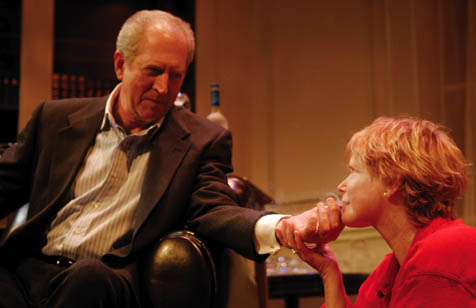A Delicate Balance
At the Rubicon Theatre, Saturday, September 22.

When Edward Albee’s A Delicate Balance premiered, critics were divided. Some hailed it as great American theater, while others were less than enthusiastic. It’s easy to see why. Despite flashes of sharp wit and moments of emotional truth, Rubicon’s current production of Balance seemed unable to find its center. Given the usual high quality of Rubicon’s work, it’s tempting to think that perhaps it’s the play itself, rather than the production, that is to blame for the mixed success of the closing show of their season.
Perhaps the most striking issue is the dialogue’s rhythm. It is frequently not dialogue at all, but rather a series of extended monologues, which leave the other actors onstage little to do. This is not, by any means, the fault of the extremely capable director James O’Neil. Given the structure of the play, any movement from another character would break the moment. Unfortunately, it’s not hard to wish, at times, that the moment could be broken by something, or anything at all.
Ironically, it is this tension that is both the play’s greatest positive force, and, in the end, its most disappointing letdown. The psychological study of Tobias and Agnes (Granville Van Dusen and Susan Clark), an aging, upper-middle-class couple with a strange set of houseguests and a dysfunctional family, could be a deeply engaging emotional journey. At some points it is; Van Dusen in particular gives a wonderful performance as a man stretched to his breaking point, confronted with too many priorities and loyalties. Bonnie Franklin is delightful as Agnes’s alcoholic sister, who protests that she is not an alcoholic but a drunk, and should therefore be allowed a martini. Her sly asides are among the highlights of the show.
However, the tension is not resolved in a satisfactory way. The lack of back and forth between the characters isolates them from one another; this is perhaps an effective point, psychologically, but not so effective dramatically. In the end, the impetus for the striking changes we see occurring in the mindsets of the characters seems insufficient. A Delicate Balance is a complex, elusive, and often allusive play, but ultimately it is also somewhat disengaged, and unengaging.



